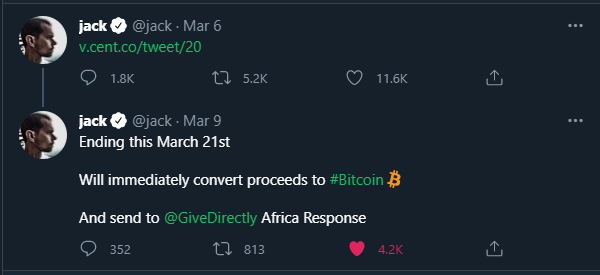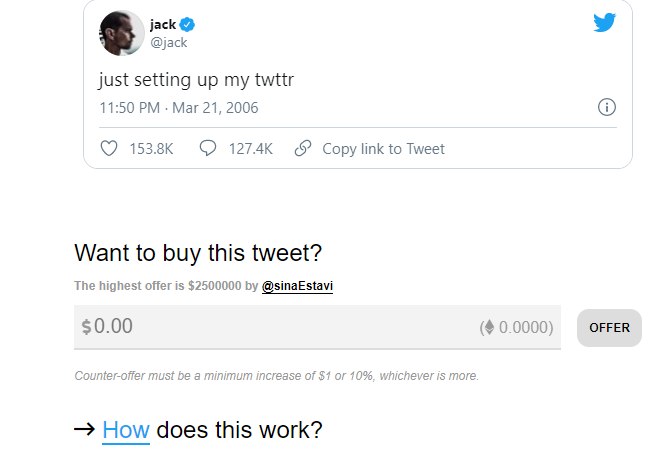Jack Dorsey’s NFT tweet will help the poor in East Africa through an upcoming bitcoin donation. To learn more about this developing story and other news, keep reading.
Jack Dorsey’s NFT Tweet to Help the Poor in East Africa
As the non-fungible token (NFT) craze continues, Jack Dorsey is auctioning his first tweet on Twitter as an NFT. Dorsey posted this tweet on May 6, 2006. The auction is taking place on Valuables and will end on March 21, 2021.

Dorsey has tweeted he will convert the proceeds of this auction to bitcoin and donate them to GiveDirectly. This is a non-profit organization that seeks to end extreme poverty in East Africa. Donations sent to GiveDirectly benefit people in Kenya, Rwanda, and Uganda.
Currently, the highest bidder of this NFT tweet was a Twitter user with the handle @sinaEstavi. He outbid Tron CEO Justin Sun, who had bid $1 million. Estavi bid $2.5 million.
Valuables wrote: “The tweet itself will continue to live on Twitter. What you are purchasing is a digital certificate of the tweet, unique because it has been signed and verified by the creator. Owning any digital content can be a financial investment, hold sentimental value, and create a relationship between collector and creator. Like an autograph on a baseball card, the NFT itself is the creator’s autograph on the content, making it scarce, unique, and valuable.”
Uncertain Regulatory Environment Pushes Crypto Firms Out of South Africa
The uncertain regulatory environment is pushing crypto firms out of South Africa. According to an article on Business Tech, the MTI scam gave regulators in South Africa a jolt and some firms will not wait to see how the matter pans out from a regulatory standpoint.
These crypto firms are planning on moving to Singapore and the UK. That is because Singapore is redrawing legislation to attract crypto firms while the UK is getting requests to embrace cryptocurrencies.
Revix, a crypto investment platform that allows customers to invest in a bundle of cryptocurrencies, is moving its headquarters from Cape Town to the UK. The company is also considering setting up in Germany to scale its operations.
Luno is another crypto company with headquarters in the UK despite being owned by South Africans. The exchange also operates in Singapore.
South African regulators “have been incredibly slow in terms of regulation in the industry and that leads to businesses looking internationally. In an unregulated environment, a customer arrives at our platform with skepticism, and rightfully so,” said Revix CEO Sean Sanders in an interview.
According to Sanders, the uncertainty regarding potential regulation is also making it difficult for crypto firms to market their services on social media platforms thereby limiting growth.
Binance CEO CZ Among the Top Blockchain Billionaires in 2021
Binance CEO, Changpeng Zhao (CZ), is among the top blockchain billionaires in 2021 according to the latest Hurun global list. CZ and 16 other billionaires have cumulative wealth of US$ 77 billion. These billionaires have generated their wealth from running crypto exchanges, investing in cryptocurrencies, and mining crypto.
After facing a price correction in 2018, crypto billionaires are enjoying a boost in their wealth thanks to the recent bull run.
The top five billionaires are Brian Armstrong of Coinbase, Sam Bankman-Fried of FTX, Changpeng Zhao, Chris Larsen, and Jed McCaleb of Ripple. Their net worth is $11.5 billion, $10 billion, $8 billion, $5.1 billion, and $3.2 billion, in that order.
To learn more about Bitcoin, download the Bitcoin Beginner’s Handbook for free.


 Features3 years ago
Features3 years ago
 Bitcoin2 years ago
Bitcoin2 years ago
 Features3 years ago
Features3 years ago
 Features3 years ago
Features3 years ago
 Features3 years ago
Features3 years ago
 Features3 years ago
Features3 years ago
 Features8 months ago
Features8 months ago
 Bitcoin10 months ago
Bitcoin10 months ago




















 Central African Republic (CAR) has set up a 15-member committee that will be responsible for developing a bill on the use of cryptocurrencies and tokenization in the region.
Central African Republic (CAR) has set up a 15-member committee that will be responsible for developing a bill on the use of cryptocurrencies and tokenization in the region.
